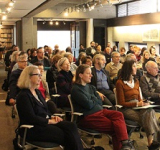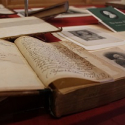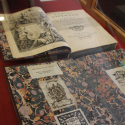Talk given by Dr. Mark Towsey from the University of Liverpool and hosted by ROAAr, McGill Library.

When: March 20, 2018
Location: McLennan Library Building, Colgate Seminar Room, Rare Books and Special Collections (4th floor), 3459 rue McTavish, Montreal, QC, H3A 0C9, CA
Description
French description below.
Dr. Mark Towsey presented a fascinating story of David Hume's History of England (1754-62). This work was one of the best selling books of the eighteenth century, and for that reason, it ran through a dazzling range of editions and circulated very widely at public lending libraries. Yet Hume's History was no beach-read, it was a deeply challenging text that scorned cherished ideas of religious history and undermined some core facets British constitutional identity. In particular, Dr. Towsey brought to the audience’s attention some of the following intriguing questions: How did eighteenth-century readers interact with a best-seller? How did readers take possession of the text for themselves? And how can we recover past reading experiences?
Beginning with who was reading Hume’s History, Dr. Towsey took the audience on a tour of eighteenth-century readers. We met the "bookish Widows" who frequented subscription libraries. We learned of politicians and royals who studied and annotated the Hume’s History in preparation for legal battles and public life. We heard of scholars, students, and readers who made the text their own in tangible ways.
McGill has a large selection of Hume publications, correspondence and manuscripts and Prof. Towsey showed how this material supports the study of reader response. Ranging from juvenile doodles all the way through to detailed critical commentary in a copy of Hume’s controversial Dialogues of Natural Religion, readers worked with this difficult text. Although scholars today are rarely able to identify the readers responsible for these marginalia, they nevertheless reveal in often startling detail how Hume’s original readers made sense of his ideas – and thereby complete the ‘communications circuit’ of Hume’s works, from author to publisher, bookseller, reviewers, libraries, owners and readers.
The lecture was accompanied by a display curated by Ann Marie Holland that featured many of David Hume’s works, including numerous editions of Hume’s History of England, and other related materials.
This event was supported by the Social Sciences and Humanities Research Council of Canada.
Le professeur Mark Towsey a relaté l’histoire fascinante de l’ouvrage de David Hume, Histoire d’Angleterre (rédigé entre 1754 et 1762). Cette œuvre a figuré parmi les succès de librairie du XVIIIe siècle, et c’est pourquoi elle a connu un nombre faramineux de rééditions et que les bibliothèques publiques l’ont abondamment diffusée. Cela dit, l’œuvre n’était assurément pas une lecture légère. Il s’agissait d’un texte fort complexe qui faisait fi d’idées chères à l’histoire religieuse et minait certains volets fondamentaux de l’identité constitutionnelle britannique. Le professeur Towsey a notamment attiré l’attention de l’auditoire sur certaines questions intrigantes : comment le lecteur du XVIIIe siècle composait-il avec un succès de librairie? Comment s’appropriait-il les textes? Et comment peut-on récupérer son expérience?
Le professeur a brossé un portrait du lecteur du XVIIIe siècle en commençant par celui de l’Histoire d’Angleterre de Hume. Nous avons fait la connaissance des « veuves bibliophiles » qui fréquentaient les bibliothèques commerciales. Et celle de politiciens et de nobles qui ont étudié cette œuvre pour se préparer à des batailles juridiques et à la vie mondaine. Ajoutons les universitaires, les étudiants et les lecteurs qui se sont approprié le texte bien concrètement.
McGill possède un large éventail de publications, de lettres et de manuscrits de l’auteur, et le professeur Towsey a illustré comment ces documents appuient l’étude de la réaction du lecteur. Des gribouillages juvéniles aux commentaires critiques pointus recensés dans les controversés Dialogues sur la religion naturelle, les lecteurs ont potassé ce texte difficile de Hume. Si les érudits d’aujourd’hui sont bien en peine de découvrir l’identité des auteurs de ces annotations en marge, les gribouillis révèlent, souvent par des détails saisissants, comment les idées du penseur ont fait leur chemin chez ses premiers lecteurs – et bouclent ainsi la boucle du « circuit des communications » de ses travaux, de l’auteur à l’éditeur, en passant par les libraires, les critiques, les bibliothécaires, les acheteurs et les lecteurs.
La conférence s’accompagnait d’une exposition de multiples travaux de David Hume, dont nombre d’éditions de son Histoire d’Angleterre et de documents connexes qu’a préparés Ann Marie Holland.






Bio
Dr. Mark Towsey studied at the University of St Andrews at the undergraduate and postgraduate level, completing his doctorate in 2007. After one year at the Institute of Historical Research, University of London, as the Past and Present Society’s Postdoctoral Fellow, Towsey arrived in Liverpool in October 2008 on a three-year Leverhulme Early Career Fellowship. He was then appointed to a permanent position as Lecturer in 2010. His primary interests include the history of reading in the eighteenth and nineteenth centuries, using the practice and experience of reading in the past as a key to understanding much broader social and cultural processes across the English-speaking world. This research agenda was pioneered by his monograph on the social impact of the Enlightenment in Scotland, but he has since broadened out my interests to include published research on the cultural history of libraries, the reading experiences of Napoleonic prisoners of war, and the history of women's reading.


